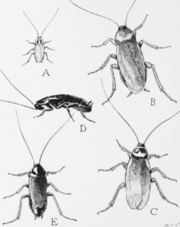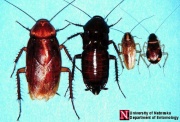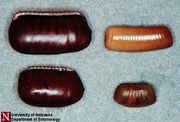Difference between revisions of "Cockroach"
| Line 13: | Line 13: | ||
[[File:Common.cockroaches_Univ.Nebr.jpg|thumb|Common cockroaches]] | [[File:Common.cockroaches_Univ.Nebr.jpg|thumb|Common cockroaches]] | ||
| − | + | [[File:Cockroach.oothecae_Univ.Nebr.jpg|thumb|Comparison of Cockroach Oothecae]] | |
| − | == | + | == Risks == |
Can produce surface erosion on many types of materials | Can produce surface erosion on many types of materials | ||
| − | == | + | ==Resources and Citations== |
| − | |||
| − | |||
| − | |||
| − | |||
| − | |||
| − | |||
| − | |||
| − | |||
| − | + | * Museum Pests [[https://museumpests.net/ website]] | |
* ''Van Nostrand's Scientific Encyclopedia'', Douglas M. Considine (ed.), Van Nostrand Reinhold, New York, 1976 | * ''Van Nostrand's Scientific Encyclopedia'', Douglas M. Considine (ed.), Van Nostrand Reinhold, New York, 1976 | ||
Revision as of 12:59, 1 July 2022

Description
General name for flat, oval-shaped brown insects of the family Blattidae. They are common household pests and can grow to 9 cm long. Cockroaches are nocturnal and sensitive to light. They have highly sensitive antennae that enable them to detect tiny amounts of food and moisture. Their ability to sense air movements allows them to flee from danger. Both the nymphs and adults feed on almost anything, such as starchy, sugary, and proteinaceous foods. They will eat cloth that is sized with starch or glue. Common desiccating powders such as Boric acid, Dri-die and Sulfur are used along with pesticides to exterminate cockroaches. Pyrethrin powder is also commonly used but it is most effective as an attractant and knock-down agent, not as as Insecticide.
See also American cockroach, Brown banded cockroach, German cockroach and Oriental cockroach.
Risks
Can produce surface erosion on many types of materials
Resources and Citations
- Museum Pests [website]
- Van Nostrand's Scientific Encyclopedia, Douglas M. Considine (ed.), Van Nostrand Reinhold, New York, 1976
- Random House, Webster's Encyclopedic Unabridged Dictionary of the English Language, Grammercy Book, New York, 1997
- The American Heritage Dictionary or Encarta, via Microsoft Bookshelf 98, Microsoft Corp., 1998
- Lynda A. Zycherman, J.Richard Schrock, A Guide to Museum Pest Control, FAIC and Association of Systematics Collections, Washington DC, 1988
- Hermann Kuhn, Conservation and Restoration of Works of Art and Antiquities, Butterworths, London, 1986
- G.Caneva, M.P.Nugari, O.Salvadori, Biology in the Conservation of Works of Art, ICCROM, Rome, 1991

